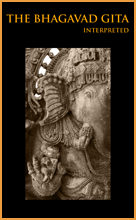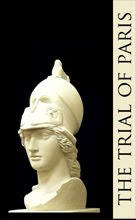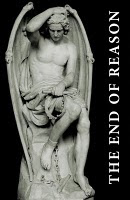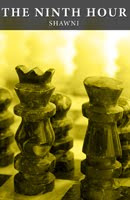Between work and other distractions, I’ve been slow about posting. But then, this was not intended as an exercise in writing random daily thoughts. I’ve preferred to wait until I’ve had something I wanted to say, relevant at least to writing this book. Of course, I keep changing my strategy for tackling the work and am well over 10,000 words into The Temple of Hanuman, which tends to limit my options. But I only have about two-thirds of the stories from the Ramayana that I plan to use and, in the meantime, am looking for pages of notes that I’ve misplaced. I expect they’ll turn up, unless I’ve inadvertently thrown them away. Nevertheless, this is all a wonderful testament to my lack of organization and my inability to keep my thoughts focused on more than a few things at once.
As I’m going through this process, I’m remembering more clearly how I wrote the three books comprising The End of Reason. Many years ago, I read Sufi teaching stories collected and translated into English by Idries Shah and published by The Octagon Press under such titles as The Hundred Tales of Wisdom and Tales of the Dervishes. My interest in Sufism was piqued by these inoffensive little books and helped warm me up to original source material like Rumi’s Masnavi and Fihi Ma Fihi, Attar’s Conference of the Birds and Sadi’s The Rose Garden. The process was similar (though not quite simultaneous) to my introduction to world music beginning with Peter Gabriel’s soundtrack Passion, which led me to Passion Sources, which led me to original works of both modern world-fusion music (e.g., David Parsons, Stellamara, Vas) and traditional world music recordings upon which the former genre is based. Of course, there’s very little in the way of modern “world fusion” literature, even counting my own work or vastly better-know authors like Kahlil Gibran or Edward FitzGerald. But if popularity were my aim, I would have given up in disgust and disappointment some time ago.
Originally, I wrote original stories and recast traditional stories independently of any broader narrative structure. Many of the stories within In Herod’s Keep were written this way and only later did I create the conversation between Herod and John in which those tales were organized and integrated. The Madness of God was written differently; the idea for the narrative structure was in place; only then I scoured Sufi literature, Jewish mythology, and Christian apocrypha for stories that I could use, or bend, to Iblis’ arguments. The Men Who Have the Elephant was written not as a narrative structure in which teaching stories could be framed but to reflect upon and to wrap up the arguments made in the two previous works. Moreover, these three parts grew out of one another. The Madness of God nearly ended up as a long section within In Herod’s Keep and was conceived after much deliberation on John’s arguments relating to theodicy. The Men Who Have the Elephant, meanwhile, was written as commentary on the two previous works and to offer something of a resolution.
The Temple of Hanuman is being written much like The Madness of God. In general terms I’d already conceived of the work and who and what it would probably cover and already knew where I wanted it to go. In the meantime, I’m collecting stories from the Ramayana (and will collect stories from the Mahabharata, the Bhagavata Purana, and the Gitagovinda). These stories once collected, refashioned, and retold are the hinge upon which the dialogue of the book will turn. My focus must necessarily be on these original works first; from them I will draw out the stories I need to support the arguments I make.
Saturday, February 25, 2006
Friday, February 3, 2006
Rethinking Krishna
 The Temple of Hanuman is developing quickly, far faster than I expected. Because it is the first of what I anticipated would be three parts, and because The End of Reason is constructed similarly of three parts, I didn’t expect the Temple of Hanuman to be longer than 20,000 words. I’m already nearly halfway to that point. I’m relatively satisfied that the Temple of Hanuman is moving in the right direction thematically, though there is room for improvement over the current draft. Yet I’m becoming increasingly uneasy that the exclusive focus in the Temple of Hanuman on stories of and relating to Rama will not have the impact that I need of it. I’ve fought the urge repeatedly in the last weeks to slip in references to Krishna from the Gita Govinda and the Bhagavad Gita. Issues that Aurangzeb raises are not, in my view, adequately answered by reference only to the Ramayana (whichever version: I rely primarily on Valmiki but am finding the Kamban version a useful perspective on some of the stories and am enjoying the somewhat amateurish but occasionally inspiring televised version [in 78 parts] which relies on those and many other versions of the Ramayana.) In fact, the arguments that I’m making relying exclusively on reference to Rama could be much strengthened by adding references to the life and mission of Krishna. I could not only strengthen arguments I’m already making, but adding stories of Krishna will improve the work as narrative entertainment, and will allow me to address head on issues of caste and reincarnation, which are not a focus of the Ramayana. Introducing references to Krishna, however, would add a level of complexity to the work that may be difficult to manage. Consider that Hanuman is remembered as Rama’s servant, not Krishna's. But this complexity would add a new dimension to the work that allows me to make what I feel is the most crucial argument: to borrow from the Quran, I can argue more persuasively, “No distinction do We make between any of His messengers.”
The Temple of Hanuman is developing quickly, far faster than I expected. Because it is the first of what I anticipated would be three parts, and because The End of Reason is constructed similarly of three parts, I didn’t expect the Temple of Hanuman to be longer than 20,000 words. I’m already nearly halfway to that point. I’m relatively satisfied that the Temple of Hanuman is moving in the right direction thematically, though there is room for improvement over the current draft. Yet I’m becoming increasingly uneasy that the exclusive focus in the Temple of Hanuman on stories of and relating to Rama will not have the impact that I need of it. I’ve fought the urge repeatedly in the last weeks to slip in references to Krishna from the Gita Govinda and the Bhagavad Gita. Issues that Aurangzeb raises are not, in my view, adequately answered by reference only to the Ramayana (whichever version: I rely primarily on Valmiki but am finding the Kamban version a useful perspective on some of the stories and am enjoying the somewhat amateurish but occasionally inspiring televised version [in 78 parts] which relies on those and many other versions of the Ramayana.) In fact, the arguments that I’m making relying exclusively on reference to Rama could be much strengthened by adding references to the life and mission of Krishna. I could not only strengthen arguments I’m already making, but adding stories of Krishna will improve the work as narrative entertainment, and will allow me to address head on issues of caste and reincarnation, which are not a focus of the Ramayana. Introducing references to Krishna, however, would add a level of complexity to the work that may be difficult to manage. Consider that Hanuman is remembered as Rama’s servant, not Krishna's. But this complexity would add a new dimension to the work that allows me to make what I feel is the most crucial argument: to borrow from the Quran, I can argue more persuasively, “No distinction do We make between any of His messengers.”Adding references to Krishna will eliminate the need for the second of the three planned books and will cause the Temple of Hanuman to run twice as long as the planned, but not realized, last book of Breaking the Wheel that was to include coverage of the Buddha. I suspect that my decision will be to include stories of Krishna in the Temple of Hanuman and forget the second of the three books and likewise to eliminate the third book altogether, and save stories of the Buddha either for a later work or ultimately to pull those references into the Temple of Hanuman. At the moment, however, my focus is getting stories from the Ramayana down on paper and in some kind of order to make coherent arguments about the nature of religious revelation. In short, now that I’ve made some progress, I’m feeling that my original plan for the work was probably the best plan and that the plan I developed later, breaking the books up by religious figure (book one-Rama, book two-Krishna, book three-the Buddha) was merely my attempt at that time to approach the problem of integration by avoiding it entirely. In retrospect, the plan was flawed and I’m likely to abandon it. Unless, of course, I change my mind again. In the meantime I plan to finish the work with reference only to the Ramayana and then, in the second draft stage, begin incorporating and integrating stories from the life of Krishna.
Wednesday, February 1, 2006
The Limits of Dharma
What caste are you that you are cast out by His command? What obligation will you fulfill if, by fulfilling it, you are distant from Him? You cannot uphold dharma if in your actions you have rejected Him or if by your actions He has rejected you. There is no dharma except that you must obey Him. If you turn away from His command, you have strayed from dharma, though you may be the author of every righteous act and the father of every virtue. O doer, surrender the fruits of what you have done. Give it in the way of charity, but do not be proud in your liberality, for this is not submission. If they accuse you of idolatry, they are right, for by accepting the rewards of your actions, you have achieved your ends and not His. There can be no “you” remaining; you cannot offer what you have also consumed; such an offering is pollution itself. O widower, cast yourself into the pyre as the moth to the lantern. Let yourself be consumed in fire. Give up all hope for yourself and cast away worthless ambition. Do not seek His pleasure for some mean reward; serving Him is sufficient reward for you.
 Remember the names of Vishnu, Brahma, and Shiva and see that they are in truth One word, One voice, the One unalterable as He alters, invisible as He invests every atom of creation with His command, unknowable even as He is the source of all knowledge. From the lotus of His navel, He has created the universe. By the ceremony of cord, see how your actions are connected to Him. Perform your duty, honor the righteous who came before you, even as you seek a path like theirs; forgive the unrighteous, even as you repudiate them. Be careful that the cord not wrap around your neck. It is better to break the cord of duty than to be stillborn. It is better to cut the thread of tradition than to be bound to tradition’s corpse. Do not imagine that you are always aware of your duty or that your father’s obligations are necessarily yours. This is the first law of dharma: seek Him out in the world. Purify your heart and with the eye of detachment, find your way not on the basis of what your fathers’ have done, but according to His will and His command. This is the first law of dharma: seek Him out in the world. You will find Him if you but look to Rama, Krishna, and the Buddha and discover that they are in truth One word, One voice, the One unalterable as He alters, invisible as He invests every atom of creation with His command, unknowable even as He is the source of all knowledge.
Remember the names of Vishnu, Brahma, and Shiva and see that they are in truth One word, One voice, the One unalterable as He alters, invisible as He invests every atom of creation with His command, unknowable even as He is the source of all knowledge. From the lotus of His navel, He has created the universe. By the ceremony of cord, see how your actions are connected to Him. Perform your duty, honor the righteous who came before you, even as you seek a path like theirs; forgive the unrighteous, even as you repudiate them. Be careful that the cord not wrap around your neck. It is better to break the cord of duty than to be stillborn. It is better to cut the thread of tradition than to be bound to tradition’s corpse. Do not imagine that you are always aware of your duty or that your father’s obligations are necessarily yours. This is the first law of dharma: seek Him out in the world. Purify your heart and with the eye of detachment, find your way not on the basis of what your fathers’ have done, but according to His will and His command. This is the first law of dharma: seek Him out in the world. You will find Him if you but look to Rama, Krishna, and the Buddha and discover that they are in truth One word, One voice, the One unalterable as He alters, invisible as He invests every atom of creation with His command, unknowable even as He is the source of all knowledge.
 After the river Ganges flowed over Shiva’s locks, it reached the three worlds. This sacred river flowed at once among gods, among men, among demons. Though they have called this river by a thousand names, still it is One, it is the Ganges. Likewise, though He has walked among us with different names, performing different duties, teaching different lessons, consider that He has always performed only His will. The teacher does not teach a single lesson to his students, but teaches them differently every day according to their capacity and according to His goal. Why do you squabble and chatter among yourselves and vaunt one lesson over another? Do you not see the source of those lessons? Honor the source of the Ganges, not the little part you have found or the first tributary in which you have been cleansed, as though no other tributary existed. The river extends far beyond the grasp of your vision. By His work, men perceive the illusion of the many, but He is and has been and always will be One. Do not doubt this.
After the river Ganges flowed over Shiva’s locks, it reached the three worlds. This sacred river flowed at once among gods, among men, among demons. Though they have called this river by a thousand names, still it is One, it is the Ganges. Likewise, though He has walked among us with different names, performing different duties, teaching different lessons, consider that He has always performed only His will. The teacher does not teach a single lesson to his students, but teaches them differently every day according to their capacity and according to His goal. Why do you squabble and chatter among yourselves and vaunt one lesson over another? Do you not see the source of those lessons? Honor the source of the Ganges, not the little part you have found or the first tributary in which you have been cleansed, as though no other tributary existed. The river extends far beyond the grasp of your vision. By His work, men perceive the illusion of the many, but He is and has been and always will be One. Do not doubt this.
 Remember the names of Vishnu, Brahma, and Shiva and see that they are in truth One word, One voice, the One unalterable as He alters, invisible as He invests every atom of creation with His command, unknowable even as He is the source of all knowledge. From the lotus of His navel, He has created the universe. By the ceremony of cord, see how your actions are connected to Him. Perform your duty, honor the righteous who came before you, even as you seek a path like theirs; forgive the unrighteous, even as you repudiate them. Be careful that the cord not wrap around your neck. It is better to break the cord of duty than to be stillborn. It is better to cut the thread of tradition than to be bound to tradition’s corpse. Do not imagine that you are always aware of your duty or that your father’s obligations are necessarily yours. This is the first law of dharma: seek Him out in the world. Purify your heart and with the eye of detachment, find your way not on the basis of what your fathers’ have done, but according to His will and His command. This is the first law of dharma: seek Him out in the world. You will find Him if you but look to Rama, Krishna, and the Buddha and discover that they are in truth One word, One voice, the One unalterable as He alters, invisible as He invests every atom of creation with His command, unknowable even as He is the source of all knowledge.
Remember the names of Vishnu, Brahma, and Shiva and see that they are in truth One word, One voice, the One unalterable as He alters, invisible as He invests every atom of creation with His command, unknowable even as He is the source of all knowledge. From the lotus of His navel, He has created the universe. By the ceremony of cord, see how your actions are connected to Him. Perform your duty, honor the righteous who came before you, even as you seek a path like theirs; forgive the unrighteous, even as you repudiate them. Be careful that the cord not wrap around your neck. It is better to break the cord of duty than to be stillborn. It is better to cut the thread of tradition than to be bound to tradition’s corpse. Do not imagine that you are always aware of your duty or that your father’s obligations are necessarily yours. This is the first law of dharma: seek Him out in the world. Purify your heart and with the eye of detachment, find your way not on the basis of what your fathers’ have done, but according to His will and His command. This is the first law of dharma: seek Him out in the world. You will find Him if you but look to Rama, Krishna, and the Buddha and discover that they are in truth One word, One voice, the One unalterable as He alters, invisible as He invests every atom of creation with His command, unknowable even as He is the source of all knowledge. After the river Ganges flowed over Shiva’s locks, it reached the three worlds. This sacred river flowed at once among gods, among men, among demons. Though they have called this river by a thousand names, still it is One, it is the Ganges. Likewise, though He has walked among us with different names, performing different duties, teaching different lessons, consider that He has always performed only His will. The teacher does not teach a single lesson to his students, but teaches them differently every day according to their capacity and according to His goal. Why do you squabble and chatter among yourselves and vaunt one lesson over another? Do you not see the source of those lessons? Honor the source of the Ganges, not the little part you have found or the first tributary in which you have been cleansed, as though no other tributary existed. The river extends far beyond the grasp of your vision. By His work, men perceive the illusion of the many, but He is and has been and always will be One. Do not doubt this.
After the river Ganges flowed over Shiva’s locks, it reached the three worlds. This sacred river flowed at once among gods, among men, among demons. Though they have called this river by a thousand names, still it is One, it is the Ganges. Likewise, though He has walked among us with different names, performing different duties, teaching different lessons, consider that He has always performed only His will. The teacher does not teach a single lesson to his students, but teaches them differently every day according to their capacity and according to His goal. Why do you squabble and chatter among yourselves and vaunt one lesson over another? Do you not see the source of those lessons? Honor the source of the Ganges, not the little part you have found or the first tributary in which you have been cleansed, as though no other tributary existed. The river extends far beyond the grasp of your vision. By His work, men perceive the illusion of the many, but He is and has been and always will be One. Do not doubt this.
Subscribe to:
Posts (Atom)





